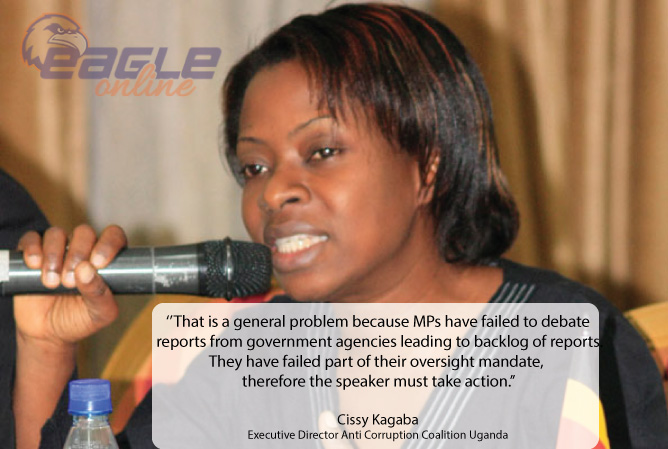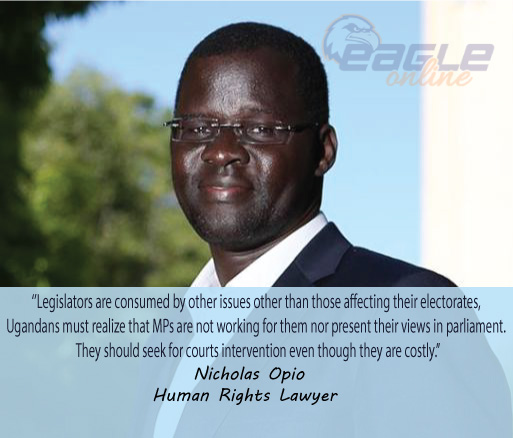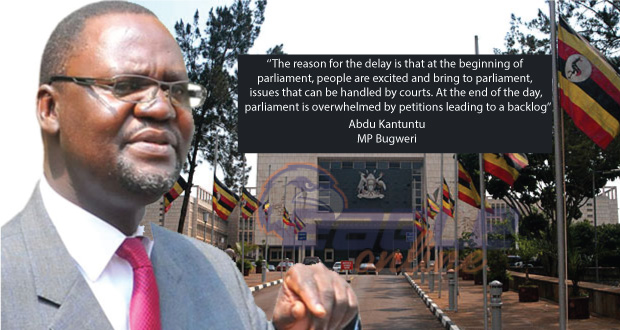Mid last year, Raphael Magyezi, the Member of Parliament representing Igara West, mooted an idea to have the presidential age limit cap of 75 years expunged from the Constitution.
Magyezi tabled his motion, a ‘private members bill’, and in a record time, it was ‘debated’, forwarded to the legal committee of Parliament, passed and assented to.
And, much as many did not deem it a priority, with many others saying it was floated to benefit only one individual, Magyezi’s bill that seemed like an offshoot from the thinking of Arua Municipality MP Ibrahim Abiriga and State Minister for Privatisation and Koboko Woman MP Evelyn Anite, is now law!
Needless to say however, almost every year there is a complaint about parliamentary committees’ failure to handle their designated work on time.
Indeed, at Parliament’s end of year Party in 2014, Speaker Rebecca Kadaga expressed displeasure at the slow approach with which most House committees handled business.
As the legislators sipped on glasses of wine and celebrated with glee, the Speaker warned she will go hard on sluggish committees and as if to buttress her assertions, she announced a travel ban out of the city for the MPs until work was seen to be done.
She also said that henceforth, she was going to be strictly ruthless on the 45-day rule within which work had to be done by committees—the legislators in attendance sipped and nodded with promising reaction.
In executing its representation role, Parliament receives petitions from the public. The petitions, which simply put are complaints on public policy and governance issues, are expected to be investigated and recommendations be made by Parliament.
Click on the link below for list of the unresolved petitions.
However, a study by Eagle Online shows that out of close to 100 petitions brought to Parliament between 2011 and 2016, over sixty remain unresolved. Most of the petitions have now been over taken by events or the petitioners simply lost hope and gave up.

“That is a general problem because MPs have failed to debate reports from government agencies leading to backlog of reports,” said Ms Cissy Kagaba, a political commentator and Executive Director of Anti-Corruption Coalition Uganda. She added: “They have failed part of their oversight mandate, therefore the Speaker must take action.”
Among committees with a high level of backlog is the committee on gender (seven petitions), the committee on physical infrastructure (8 pending petitions), the committee on trade and industry (7) the House Committee on Education (7) and the committee on finance.
Rationalizing the committees’ failure to do the their work in perspective, Political Scientist Dr Frederick Kisekka-Ntale, says the reason for this unfinished business is that in most cases many people are elected to Parliament due to political factors.
According to Dr. Kisekka-Ntale, whereas MPS are expected to do legislative representation and constituency work, they, in most cases concentrate more on ‘constituency legislation’ as opposed to legislative representation.
“This because the people who voted them never did so basing on the ability of them being able to be good legislators but good politicians (omuntu wa bantu, omwana waffe). Therefore, this makes MPS concentrate on attending burials, weddings, funeral rites rather than performing their legislative role in Parliament, leaving a backlog,” Dr. Kisekka-Ntale emphasises.
Further still, the political science researcher and don notes that the caliber of the people sent to Parliament is not up to the task.
“Many of them do not understand what takes place in Parliament. They just find themselves in Parliament because of certain factors; for example a situation where the incumbent is weak or not liked by the electorate and hence the need to replace him with anybody.
“There is also a case of seasonal political events like age limit bill, marriage and divorce bill, domestic violence bill which reduces their capacity to perform,” Dr. Kisekka-Ntale said adding that the way forward is for Parliament to focus on its legislative role and concentrate less on ‘constituency representation’.
Asked whether having a backlog means Parliament has not done its work, the former Makerere Institute of Social Research (MISR) scholar said: “No, because Parliament is autonomous and performance can be measured by whatever little they have been able to accomplish.”
Some of the pending petitions include a petition by now Minister Chris Baryomunsi tabled in 2012 but brought to Parliament by timber dealers, regarding the embargo imposed by the Minister of Water and Environment on the sawing of trees for timber.
Another is a 2012 petition tabled by now Opposition Chief Whip, Ibrahim Ssemujju Nganda – brought by councillors of Kiira Town Council – on matters pertaining to the mismanagement of Council funds.
In 2013, MP Joseph Ssewungu tabled a petition brought by pupils, parents and the school management committee of Nakasero Primary School, on the grabbing of land at Plot 34A Kyadondo Road and Plot 5C Mackinnon Road measuring 0.657 hectares, by Prestigious Apartments Limited in collusion with Uganda Land Commission.
Yet still, in 2014 the Community of Lira District petitioned the Parliament of Uganda on the low Status of Life Saving Emergency Services for Pregnant Women and Newborns in the Health Centers IIIs and IVs of Lira. This was referred to the Committee on Health ‘for scrutiny’.
Similarly, a 2012 petition against illegal/unjust removal from service and breach of contract by the Uganda Public Employees Union is captured as ‘report ready but the issue is in court; so matter halted in Committee’.
Also, the status of a 2012 petition by children living with HIV/AIDS against the challenges faced accessing HIV/AIDS health care is captured as ‘still under consideration’.
Further, a petition by ‘Strategic Leadership Forum’ on the closure of Primary Teachers Training Colleges tabled by now primary education state minister Rosemary Sseninde in 2011 collected dust and was overtaken by events.

“Legislators are consumed by other issues other than those affecting their electorates, Ugandans must realize that MPs are not working for them nor present their views in Parliament,” internationally acclaimed Human Rights defender and local political pundit, Nicholas Opio says. “They should seek for courts intervention even though they are costly”
However, senior legislator and celebrated committee on Statutory Authorities and State Enterprises (COSASE) chair, Abdu Katuntu, says the delay should be partly blamed on ‘rural excitement’ by voters who, at the beginning of Parliament, raise petty issues with their MPs.
“They bring to Parliament issues that can be handled by courts. At the end of the day, Parliament is overwhelmed by petitions leading to a backlog. Secondly it depends on the leadership of the committees where the reports are directed. Some committee leaders prioritize certain petitions reports at the expense others hence leaving some ignored, Katuntu said.
“Sometimes it as a result of events Parliament and the country generally like the recently passed presidential age limit bill turning the attention of Parliament from some issues and concentrating on others. It also makes the petitioners to lose interest in their petitioners,” he said, adding that the backlog notwithstanding, people still have faith in the institution.
“By the time the citizens petition Parliament, they have hope in the citizens to solve their problems, wrangles, and others. It is a great disappointment on our side as leaders when we do not deliver. On whether Parliament has not done its job; no, we can do better,” Katuntu said.
His Ajuri County colleague Hamson Obua, says petitioners should be proactive in nature and make follow ups through their lead petitioners.
“Parliament has rules and procedures to follow; it is the duty of the Speaker to ensure that these are respected and followed. When a petition is sent a committee, a report is expected within 45 days and failure to do so is inefficiency and ineffectiveness. On whether this means Parliament has betrayed the electorate, yes, but this calls for improvement in efficiency and effectiveness,” Obua said.
Obua’s assertion is buttressed by Mbale Woman MP Connie Nakayenze, who says sometimes committees finish the investigations but fail to get their reports on the order paper for presentation.
“This does not mean that the committee has not done its work but the Clerk to Parliament or the Leader of Government Business may have some priority business that they may want handled thus creating backlog.
“As a way forward, the petitioners should follow up their petitions with the Office of the Speaker and committee leadership. Our people need to understand that this does not mean that Parliament has failed in its duty but it is as a result of the busy schedule of Parliament,” she said.
Parliament’s Director of Communications and Public Affairs, Chris Obore, could not be got for a comment and is yet to reply to text messages from our reporters.
Legislative researcher Hippo Twebaze blamed the backlog of petitions and bills in Parliament on Parliamentarians, saying they concentrate more on political matters and other matters that are considered to be of national importance.
“This makes MPS to put most of their energy on such matters that the political regime has interest in. The implication of this an indication of poor performance on the side of the Parliamentarians. If someone is elected to represent its electorate and the term ends without completion its business, its total incompetence,” Twebaze said.
Twebaze added: “The way forward is for Parliament to follow its rules of procedure and ensure that whatever is before Parliament way must find its way on the order paper. There must be a mechanism of balancing political issues and issues affecting the citizens directly.”
Additional reporting by Steven Mandu






